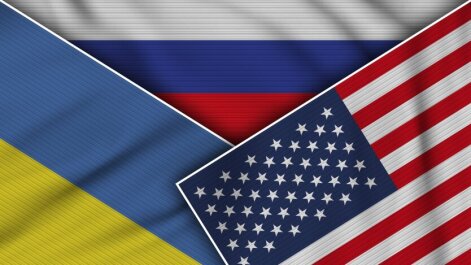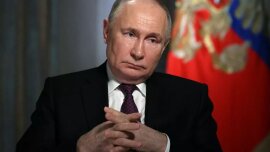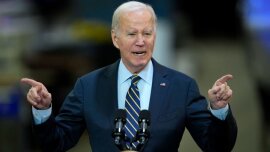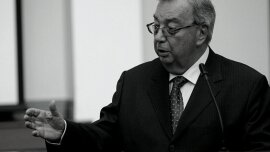Russia made some radical proposals to the collective West on the division of spheres of influence in Europe and the world. A very dangerous situation has developed for Ukraine, which, in the event of a further aggravation of relations with Russia, is fraught with new territorial losses.
In a new conversation with Yuri Romanenko, the well-known Ukrainian diplomat Alexander Chaly explains how Ukraine can get out of the danger zone.
Aleksandr CHALY – Ambassador Extraordinary and Plenipotentiary of Ukraine. Honorary lawyer of Ukraine, Ph.D. in law. President of Grant Thornton Ukraine. Member of top-level international commission «Euro-Atlantic Security Initiative» , member of Supervisory Board of United World International Fund and co-chairman of Working group of National Convention on the EU in Ukraine.
From 1993 to 2008 he worked at diplomatic service. Was the head of Treaty and Law Department at the Ministry of Foreign Affairs of Ukraine, a member of Ukraine’s Delegation on negotiations with Russia and Romania with regard to concluding basic political agreements. Later Mr.Chaly was appointed the Ambassador Extraordinary and Plenipotentiary of Ukraine to Romania.
From 1998 to 2004 he was the First Vice Minister of Foreign Affairs of Ukraine and the State Secretary of the Ministry of Foreign Affairs of Ukraine responsible for integration into the EU. In 2006-2008 he worked as the Deputy Head of Presidential Secretariat of Ukraine in charge of foreign policy and as the Foreign Policy Counsellor to the President of Ukraine. Since January 1, 2012 – President of Grant Thornton Ukraine.
Hello, everyone! We move on with our conversations and today our guest is Aleksandr Chaly. Hello!
Good day!
And what do we want to talk about? We, of course, want to talk about the difficult situation that has formed around Ukraine, Putin's ultimatums, which have created an almost panic mood in many people. Some of my friends are going to move to Poland. By and large, the key question, it seems to me, in this situation for Ukraine, is how much room is left for maneuvers? Can we do something else to avoid a large-scale conflict with Russia and next year enter into some kind of international position that will allow us, finally, to start developing. Because the general trends that exist today in politics, economy, energy, international affairs, they all indicate that within the framework of the existing model, Ukraine, the Ukrainian state has almost completely exhausted itself and it is necessary to move to a new model in order to stay...
Yuri, thank you for the invitation. Your project is an intellectual site, which is probably the only one in Ukraine that thoroughly studies the problems of modern geopolitics and geoeconomics. And your conversations today are a breath of fresh air. You are a pluralist. In the course of your conversations, different points of view may be presented, but you still allow points of view to be expressed, which do not coincide with the mainstream now, especially with the imperious mainstream. Thank you so much for this.
Answering your friends, I have two news - good and disturbing. The good news is that I do not expect anything extraordinary until mid-January, but what will happen after the old New Year, invite me then at that time and I will give a more accurate forecast for February-March.
You can assign labels, but as a diplomat I would not say that Russia has made a kind of geopolitical ultimatum. It seems to me that Russia has made a tough geopolitical proposal to the collective West, first of all, to the States, as the leaders of the collective West. And, in my opinion, from the good, being an optimist, at least for the next three to four weeks, the collective West realized that this is in fact the moment of truth. The West did not say “no” to the Russian proposal. On the contrary, they look forward to start a dialogue with the Russian Federation, and now, let’s put it this way, the parameters of this dialogue are being coordinated.
Yes, the Russian Federation demands the answer to be concrete, so that this dialogue or these negotiations do not go into a deep, long period of time. They say that more halftones and diplomatic confusion will not be allowed. This, of course, is alarming. But the West also, it seems to me, understands strategic things that:
First, it's time to try to make an agreement.
Second, the collective West essentially lacks the tools to contain Russia, at least in its near abroad. In any case, they are losing it, and the loss for them will carry a very large strategic damage, since this will become the second Afghanistan. The Biden administration cannot allow it next year because there will be midterm elections to the US Congress.
Therefore, it seems to me, there is reason to expect a careful dialogue for the month of January-February. In the future, the situation can follow three scenarios.
The scenario of peace is the achievement of understanding of a certain new formula for European security, where the significant conditions proposed by the Russian Federation must be taken into account. I do not say everything, but a significant part.
The second option is the Cold War option. An option when the parties do not agree, and a line of confrontation between the West and Russia in their struggle for Ukraine begins to develop. This is a very unfavorable option and must be avoided.
The cold peace option implies that the parties will define the framework for negotiations and enter into long-term negotiations in order to work out, after all, a formula for reconciliation. Not peace, but reconciliation, maybe temporary, between Russia and the West regarding Ukraine.
Put your question in such a way that Ukraine, let’s put it this way, has exhausted its possibilities, but there is no strategic influence on the processes that have been launched in connection with Ukraine and regarding Ukraine. In my opinion, Ukraine has even more opportunities to be heard. But this requires a completely new foreign policy, a new paradigm of this foreign policy and, accordingly, a new domestic policy. In general, I dream that President Zelenskyy will have a second wind, and he will still be able to formulate a new foreign policy doctrine that will meet the new historical realities that have developed in Europe, in the global world. And Ukraine will be able to fit into these difficult structural changes that are taking place in the global world order. There is such a hope.
At the outset, I would like to say that so far I am satisfied with the reaction, how Ukraine is responding to these tough proposals of the Russian Federation. I am satisfied that the Ukrainian Foreign Ministry, through the mouth of its press secretary, gave a very restrained reaction. In my opinion, it was balanced. There was no reaction that we would never agree with this, we are categorically against it. The way some European countries are doing now.
Russia's strategic initiatives give us a lot of chances and opportunities. To begin with, one of the key ideas in Russia is to return to the 1997 status quo. It shocked everyone. It was in this year that Russia and NATO signed the main agreement on their relationship. Russia says something like this: As it was this year, we do not insist that such countries that joined NATO after 1997 leave NATO, but no military infrastructure of the original NATO members should be on the territory of these countries, since this was not there as of 1997.
It seems to me that Ukrainian diplomacy a priori has the opportunity to come up with the initiative that "yes, we are ready to speak in such a context, but then there must be a status quo with respect to Ukraine." Crimea in 1997 was part of Ukraine, and Donbas was also part of Ukraine. That is, we need to return to the status quo, which is what the Russian Federation is asking for in all its complexity. That is, you see, we have a fairly legitimate counter-proposal that can be made the subject of negotiations.
What I said at the last meeting, it is hardly possible to speak directly with Russia about Crimea, because they stated that it was undiscussable. But within the framework of European security, a broader, so to speak, structure, architecture, we can talk about the role of Crimea in future European security and the role of Donbas in future European security.
This is, in fact, an argument to the States. Because by including this argument in the negotiations, the United States is beginning to bargain over the Baltics and all these changes ...
Yes, and we must put this on the negotiating table ourselves, or invite the United States to start this conversation. But, in my opinion, the key issue that we must now solve here in Ukraine is the issue of our future geopolitical status. The fact is that Russia has stated very clearly and very harshly, I am sure it will not move away from this any more, what it believes, it cannot retreat further. Unfortunately, the geopolitical situation and the strategic changes that are taking place in the world are in favor of Russia's position. In the coming years, it will grow stronger both economically and in the military-political sense. This is how trends go. At least until 2030, I think Russia should have a more or less stable situation, with the exception of the transit period, when the transfer of power takes place. Russia has big risks here. That is, Russia speaks from a position of strength, since the United States, especially its internal political situation, is far from predictable stability. The rivalry between China and the United States is growing. In this regard, the United States is strategically interested in some kind of geopolitical truce with the Russian Federation.
Thus, fundamental trends are working for the Russian position, and we must understand that the most unpleasant thing that has happened in the last three weeks is that the collective West and NATO have given very clear signals. What we were talking about two years ago, three years ago, but gave clear signals that they would not fit in with Ukraine with their armed forces. Biden said this clearly, the NATO Secretary General said it clearly, that the fifth article regarding Ukraine does not work, and the British Minister of Defense said very frankly the day before yesterday. Literally: if something starts in Ukraine from the point of view of Russian aggression, no one in the world will fit in for it, for Ukraine. We must honestly admit this and honestly tell Ukraine.
For the first time, we understand that we are left face to face with the Russian Federation. And I think that everyone who thinks responsibly, everyone who thinks in terms of our statehood, our conciliarity, understands the huge risk for the future of Ukraine, the conciliarity of our country within the boundaries of 1991, if we find ourselves face to face with the Russian Federation. Especially in the coming winter months, when we have a lot of problems in the energy sector and in the supply of, for example, fuel, diesel, etc.
It is necessary to do everything possible and impossible so as not to provoke an avalanche of new Russian full-scale aggression. In my understanding, this means that we in the country must start a new strategic inclusive dialogue on the future formula for Ukraine's security.
Moreover, we must proceed from the fact that in these historical conditions, our desire for NATO and our mantras that we have the right to be in NATO, or NATO's statement that Ukraine has the right to choose NATO as a security system, is the opposite. Our real position in the field of security is only exacerbated, paradoxically. Moreover, when our colleagues from NATO declare that each country has a sovereign right to choose a security formula... As a lawyer, I was always trained that if there is a right, in respect of which no one has a corresponding responsibility, then it is not a right... This is fiction, this is fantasy.
Western countries, NATO members say "yes, the doors are open, you have the right to join," but at the same time, for more than 13 years after the Bucharest summit, they did not even give us a MAP. If there was a MAP, then our right would correspond to their certain obligations to accept us if we fulfill their conditions. But in fact we have nothing. We have a fiction. And our movement towards this fiction, unfortunately, will have a very serious impact on our security.
In my opinion, today everyone is well aware of this in Washington, Brussels, as the NATO headquarters, and in Berlin, in Paris. And, in essence, they hope that the Ukrainian elites will have enough wisdom and responsibility to understand that our role in the future of Europe is very responsible. We must appeal to both Russia and NATO and propose that they offer to conclude peace on Ukraine. That is, we should not become that bone of contention and because of which full-scale military operations can begin on our territory without any real support from NATO. It seems to me that we are in this crucial moment and it seems to me that today all responsible Ukrainian politicians who are in power, those who are in opposition, our nongovernmental elite, should think very seriously. Ukrainian statehood is at stake. At least a significant part of it.
What does Russia's ultimatum contain? What if you do not accept our key proposals, and the key one is that Ukraine should not be a NATO member. Russia did not offer what status Ukraine should have. This is where we can talk. And here we have options to choose from. Russia did not offer how it is in this situation, if Ukraine is not a member of NATO, within the framework of a new or renewed corporate system of European security, it will guarantee the territorial integrity of Ukraine. But this is precisely what we should now be talking about together with our American and NATO colleagues. This is where we need to talk and we will have a request for their positions. If we just keep silent and trust our fate to our partners, it seems to me that in any case they will be guided by their geopolitical strategic interests. And we may find ourselves in a losing situation. Therefore, it seems to me that the Russian proposals should initiate our counter-proposals today. I have not yet seen them in a big halo, but I think what happened in Guta, there was an informal meeting with all the ambassadors, I think it should give rise to this intensive work.
Because, I am absolutely sure, if the Russian proposals do not receive a serious response, a constructively serious response, albeit a tough one, we are on the verge that the next moment will be that Russia will bring the situation to the Caribbean crisis. This Cuban missile crisis may no longer take place near Cuba, but off the coast of Ukraine. For example, Russia can declare that it will make no exercises in the Black Sea zone, 200 miles from the Black Sea coast, so to speak, a zone of no-fly control of the Russian Air Force and Navy. Accordingly, this will lead to a new Cuban missile crisis. Russia will act unilaterally, they warned.
Or, in my opinion, the most likely response from Russia, if a situation occurs that they do not agree, then Russia will deploy some elements of nuclear weapons, some elements of modern weapons on the territory of Venezuela, Nicaragua, possibly Cuba, in order to create an absolutely mirror situation. Will make the deployment of medium-range missiles in the Kaliningrad region. Perhaps it will reach some agreements with Serbia, deploy elements of nuclear weapons in Belarus. Russia will begin to make such a situation to show “Since you think that each country can choose any form of protection of national interests it wants, yes, this is a sovereign right, then the sovereign right of Venezuela, the sovereign right of Cuba differs from, relatively speaking, Belarus, differs from those sovereign rights that Ukraine also has. "
There is, of course, a game here, because when the strategic interests of the United States are hampered by sovereign rights, including those of Ukraine. They bend us very easily. Let's remember nuclear disarmament. There is no article in international law that would prohibit a country from having nuclear weapons as a means of its defense. But we were given an absolutely harsh ultimatum. Or take North Korea or Iran there. International law does not prohibit nuclear weapons as long as, at least, they are in other countries. Or let's take, relatively speaking, the Cuban missile crisis. Cuba had every sovereign right to invite the Soviet Union to supply missiles to Cuba. But the United States responded based on its national superior strategic interests. Russia, actually is now declaring the same position, and this is serious. It is very serious. If the West does not hear Russia, then the world will... I am sure that the next stage of escalation is already a full-scale crisis, completely similar to the Cuban Missile Crisis. For Ukraine alone, this means being the epicenter of this crisis ...
We are in the forefront.
Yes, we are not in the first place, we are just a territory in which it can begin to develop. Therefore, we must do everything possible and impossible to get ourselves out of this confrontation between the collective West and Russia. Here I am calling for this.
Moreover, look what happened in 2014? The European Union decided to expand, including in such a form as a non-membership association. And it was the EU's initiative that it would conduct a dialogue on association only with Ukraine. It is only the sovereign right of Ukraine and the European Union to speak on this topic. Russia has expressed very strong concern. It demanded a trilateral dialogue in order to remove those negative consequences for Russia. The EU did not agree to this dialogue.
As a result, we had 2014, we lost Crimea, we lost Donbas. Well, not in a legal sense, but in fact. After that, the European Union went to trilateral consultations with Russia, but that was too late. But that was the geoeconomic aspect. That is, the EU-Russia-Ukraine is a conflict in the geo-economic scheme. Today we have a more dangerous conflict in the geopolitical scheme of the States-NATO-Ukraine-Russia.
In essence, Russia is talking about the need for a trilateral dialogue. If we do not understand this, then the result is likely to be a new escalation and in reality Ukraine is risking large territorial losses. And we should be alerted by the fact that a number of elites in the United States, even in Europe, fully admit this conflict.
Today, an article was published in America in the WSJ, where a strategist from the Atlantic Council says that yes, a conflict, a possible Russian invasion of Ukraine is bad, it is fraught with huge human losses, it is fraught with war, but from the point of view of geopolitical advantages, we also have an advantage here. In the short term, we lose; in the long term, we gain. Because Russia is being drawn into this conflict, it will be weakened and this is good for us. It is said directly.
Moreover, there are very influential financial circles in the global world and in the United States. You know, today one of the challenges for the American economy is the devaluation of the dollar. Several external conflicts in Europe, in the South China Sea, or even a too tense situation there will force everyone to go to the dollar, and this will strengthen the dollar and, accordingly, reduce its inflation. Even from the point of view of these fundamental financial and economic interests of certain classes in the States, they can benefit from a full-scale conflict in Ukraine and around Ukraine, as well as in the South China Sea, around Taiwan.
I understand that this is very unprofitable for Biden and his team, because from a strategic and military-logistic point of view, they will not be able to do anything if either China with respect to Taiwan, or Russia with respect to Ukraine, takes large-scale actions using armed forces. It's just that it is impossible even logistically to provide. Yes, in the long run ... but they have already stated regarding us that they will not intervene. They can give more financial and military assistance, but the question is who they will give it to, in what format the Ukrainian state will remain.
We are talking about very serious things and I think it is important to hear this today. And now I am grateful to you that in 2014 on March 12 you published ... I rarely write something, I say more. You published my small article, which was called "Plan for the salvation of Ukraine from Russia's aggression." I want to say everything that I wrote then is absolutely applicable to today. I wrote:
“We are on the verge of the Crimean war. Thank God, while the guns are silent, therefore diplomats can and should speak. And first of all, Ukrainian ones (what I want to say). We must understand that in these troubling moments it is not enough to appeal to countries - guarantees of the sovereignty of Ukraine and the international community in order to punish the aggressor. This is, in fact, a call to war ... We urgently need to offer a Ukrainian vision of the conditions for a possible peace (settlement of the crisis). Namely, a specific action plan that can reconcile Russia with the West, Ukraine (then I wrote) with Crimea. In other words, to give difficult answers to real challenges that push us all to the irreparable - in Kyiv and Moscow, in Simferopol and Sevastopol, in Washington and in Brussels. "
And here I gave an absolutely concrete plan, the key of which was the transformation of the Budapest Memorandum into an analogue of the state treaty on Austria.
I just wanted to say that what you are talking about now is the Austrian model, or the Finnish one.
Apparently, Finnish, because we actually have four options for action now. Or Israeli - full mobilization of the population for war. At the same time, the Israeli version of the period of the 50s of the last century, when Great Britain was against Israel, the United States was far away. Because they all said that they would not support us.
Either Finnish, or Austrian, or the share of Germany awaits us - the division of the country into two or three, so to speak, components. In my opinion, today it is very wise and reasonable to choose, undoubtedly, the option that will allow Ukraine to fulfill its historic mission, namely to transform this huge threat, which looms in general in European security, if we take it from the Urals to Lisbon, transform it into a more or less real system. And Ukrainian diplomacy could play a historical role here if it looked responsibly at the situation.
It seems to me that today this is the main challenge for us and that there is just something to do. At the same time, it is not easy to obtain this status, but also as a result of obtaining this status, to do what Finland has achieved with its policy of neutrality and Austria - the withdrawal of foreign troops from the territory of Ukraine, the return of parts of the territories, etc. including the decision on Crimea. In this regard, I would recommend that Ukrainian diplomacy put forward an ambitious plan for convening a new Helsinki meeting or a new Helsinki summit in 2025, when the world will celebrate 50 years after the Helsinki Act.
At the same time, Ukrainian diplomacy could suggest that balancing all interests within the framework of this summit requires a lengthy negotiation process. We actually have three years - 2022, 2023 and 2024. Propose to expand the number of baskets. As you remember, there were baskets of political, economic, human rights. It seems to me that we need to add environmental ("green" themes) and IT - digitalization. Five baskets at least. And, in my opinion, within the framework of such a multi-format summit, preparation for it, we would be able to balance all interests, including Crimea. After all, the meeting in Helsinki in 1975 was able to bypass the problem of the Baltic countries, which were annexed by the Soviet Union, but a solution was found that did not recognize this annexation and the Soviet Union agreed with this formulation of the question. That is, we would leave this question for the future.
The most important thing, the most, so to speak, zest in this proposal would be to possibly convince the Russians to go for it, we could declare that while preparing this meeting we maintain the status quo. That is, we are establishing a stable ceasefire in the Donbas. Even more ... NATO does not sell weapons to Ukraine. The Russian Federation is committed to withdrawing its troops from the borders with Ukraine.
Since in international law there is a principle of good faith that if negotiations begin on some issue, then the parties to the negotiations cannot take actions to the detriment of the subject of negotiations. Since the subject of negotiations would be the security of Ukraine and European security, we could work out a number of temporary measures that would not allow the situation to deteriorate. Perhaps Russia could be persuaded that this is an honest approach and that its understanding of its security will not deteriorate over these three years.
Why is Russia nervous? It really got nervous in 2021, because it understood that the prospects for Ukraine's entry into NATO are rather vague. Well, at least for a decade, but since the end of 2020 and 2021, Ukraine has not joined NATO. But NATO began to come to Ukraine through full-scale military exercises, through the supply of more or less offensive or defensive, but modern weapons, through assistance in creating military infrastructure, etc. through our demand, we supply modern Patriot air defense systems, etc.
Russia, as I understand it, has drawn two new lines - no NATO infrastructure and weapons on Ukrainian territory and NATO personnel on Ukrainian territory. But this is much more difficult to control. I understand that Russia fears that if there are just negotiations, where the status quo is not fixed during the negotiations, then Russia will think that, as it were, the situation will worsen. Therefore, it stated bluntly that if there were no direct agreements, it would act like the United States. If it thinks that something is threatening on the territory of Ukraine or in connection with Ukraine, or perhaps at some other point, it will use military force.
I don't think it will be a full-scale invasion, because from their point of view, it is unreasonable. Today, the methods of warfare are completely different. It will be non-contact striking, after which what will happen? The West has declared that it will not interfere. Ukraine, it does not have the ability to adequately respond. And Russia will uncontrollably destroy what it wants.
Well, listen, non-contact, does is mean striking missiles on the territory of Ukraine?
As the USA does
Then Ukraine can hit the border towns with Alder ("Alder" / "Alder-M" (Ukrainian Vilkha) is a Ukrainian multiple launch rocket system (MLRS) - ed) for 230 km ...
May I ask you? It seems to me that even the biggest "patriots" in quotation marks ... For 7 years after 2014, it never occurred to anyone to shoot in the direction of Crimea.
No, I'm just saying that if Russia starts to attack us, it starts to attack power plants, bridges, military ...
They will not hit power plants and bridges. Well, let's say that if they believe that there is a warehouse of some kind of weapons that are dangerous to them, they will put this warehouse out of action with a precise blow. What shall we do?
Like the States in Syria.
Well, yes. If you want to understand how Russia will act, there is no need to invent anything. For the last 20 years after Putin came to power, Russia has been acting one-on-one like the United States. Is there a foreign agent law in the United States, the world's most advanced democracy? The same was accepted in Russia. In Syria or Pakistan etc the United States act unilaterally, as Russia does in Libya. And Russia will act this way. We have forgotten some things. We are in a very critical situation if there is no real negotiation process between the West and Russia on their proposals. Indeed, on February 28, 2014, the Federal Assembly of the Russian Federation authorized the President of the Russian Federation to use the armed forces of Ukraine against the entire territory of Ukraine.
Russia.
Russia, yes.
Russian Armed Forces against Ukraine.
Do you remember this situation?
Yes. March 1, 2014.
Yes. Well, I said February 28th. March 1st, right. Can you imagine. And who? Anyone objected from the great countries, America, etc.? And today they told us that there is nothing we can do to help you. For example, Russia is not even that way. Russia will declare that they control the entire airspace over the territory of Ukraine and will not give the possibility of landing a single NATO military aircraft. What will NATO do? Well, it will be the Cuban missile crisis. NATO warplanes will fly, Russian fighters will come out to meet them. Then there will be a play of nerves. How it will end, only God knows. And then Russia will say, I am doing what you did and they warned.
By the way, you know, unlike many theoreticians, to be more specific, in my diplomatic life I have managed to attend 16 direct negotiations, large, small, with Putin, 16 times. Moreover, we worked a lot on key strategic issues, in which the President of the Russian Federation was present behind the scenes through directives. If you want to understand the logic of Russia's behavior, you need to understand two things. That they are trying to copy the United States in their actions, believing that in this case (well, as was the case with Yugoslavia, Yugoslavia could be an analogue), let's say, a contactless war. The second point is that Putin always speaks very clearly and publicly what he is going to do.
Everyone remembers Putin's Munich speech. What he said openly in Munich, he did everything exactly one to one. Ischinger, the head of the Munich conference, told me personally after 6 or 7 years: "Alexander, it's a pity that we didn't hear him in Munich." That is, what they have just said and stated, they will do. The only thing that they do not say for sure is that if they receive "no" for their proposals or the answer is not accepted by them, what will they do. But they have already shown the possibilities - there will be a military-technological response and a military-technical one. You and I can guess what it will be, but I approximately understand what it will be. That is, from some moment they will say, not a single NATO military aircraft, not a single landing on the territory of Ukraine. Just like the Americans did in Syria, Libya, Iraq, etc.
Well, what will happen next? Further, they have the ability to control Ukrainian airspace by an order of magnitude higher than that of the entire NATO, because they have logistically, especially after their aviation units have been located in Belarus, they practically close the entire perimeter of Ukraine. So what? Further, you should understand that the radio-technical troops in Russia are one of the best in the world. Western countries also admit this. That is, suppression of all interference, etc.
We must understand that the moment of truth is coming, and we must make a very responsible decision, because in my article, which I wrote in 2014, there were two parts. The first part - I gave a plan on how to avoid aggression, but at the same time I then turned to the top political leadership of the country with such a position that:
"In these troubling days of balancing war and peace, it is also important for the country's top political leadership to show character and give the world clear signals of how it is going to act if its strategic peace initiatives are not heard and aggression against the Ukrainian state is launched."
These signals were like this. Urgently, on the basis of Article 51 of the UN Charter, appeal to countries on a bilateral basis on the issue of collective security. Well, for example, the States cannot, but Poland, Lithuania, Latvia. They are ready to give their troops. Turkey gave its troops to Azerbaijan in the situation with Armenia. Yes? That is, to apply. Farther.
Well, they have a strategic alliance, one that they deepened after the Karabakh war.
Yes, but what prevents us from having such an alliance? The Turkey-Azerbaijan situation showed that a NATO country outside NATO commitments can have bilateral commitments. Just like America has in relation to Japan.
Or South Korea.
Or South Korea, for example. That is, in essence, to start immediately, probably, it would be necessary to prepare the population, to appeal to the convocation of the UN Security Council.
Farther. After all, nobody canceled the Budapest Memorandum. It's amazing to me that we forget about it even now. I understand that it is very unprofitable, first of all, for the Western countries, because they are obliged to help us and behind this non-help there are guarantees of nuclear non-proliferation. But we filled our mouth with water. That is, today, if we really believe that we are ready to enter a full-scale war with Russia for the sake of an ephemeral right, which no one promises us from NATO, that we will one day become a NATO member. It would be desirable to ask the people about this, then it is necessary to carry out some mobilization measures in relation to the population.
The first option is Israel . So far I do not see this either, but I believe that this is a wise position of our senior management, because it could provoke a situation. But, nevertheless, we must have options.
But it seems to me that the West is ready today. The West cannot say that it agrees with the Russian "ultimatum" that Ukraine cannot be a NATO member. Although, if we take the Helsinki Act, the Paris Act, and all subsequent OSCE documents, including the Alma-Ata Declaration, which was adopted, if I’m not mistaken, in 2011, the reaffirmation of the Helsinki principles, then it’s always the right of the state to choose its security formula , which was everywhere enshrined, corresponded with the responsibility of the state to maintain the indivisible security of Europe, taking into account the legitimate security interests of other countries. That is, roughly speaking, you cannot choose the security formula that puts other countries at risk.
And in this situation there is a corridor for finding a compromise. And Ukraine, as we have said, my understanding of our geopolitics is that we, within the boundaries of 1991, cannot be with one great against another. If we want to be with one great against another, we will simply be divided between them. The only question is - where will this line run? And if we don't make the right decision ... you rightly said about the reset right up to the Constitution. Why do I like the Austrian version? Everything was approximately the same as ours. It then took nine years for the Austrian population to go to a referendum and vote for Austria's neutrality.
Wait, people don’t remember, they don’t know that Austria was part of the Reich. The Anschluss took place in 1938 and after the Allies occupied the territory of the Third Reich in 1945, including Austria, there was a de-occupation regime and, in fact, the fate of Austria was determined, because they entered their territory ...
Everyone. All four (USSR, the US, Great Britain and France- ed)...
Both the Soviet Union and Western countries.
And western countries. Even in the coming days, I will give you this article with a little foreword for you to publish it again, because it is very relevant. This article ends with the words:
“Isn't it wiser in these days remaining to the point of no return (and the process went on, in Moscow, Washington, Brussels) with the participation of Kyiv to agree on the conditions that were proposed by Austria decades after World War II. Then, in 1955, no one won of the greats. They concluded a draw, but peace won in Europe. Peace that we may lose in the coming days or hours. "
Unfortunately, I was not heard in 2014 and we lost this peace, but if now we do not understand where we are realistically, what we need to do, our losses and our risks are much greater. And it seems to me that I have more hope here for the realistic position of Washington, Brussels, Berlin, Paris, because strategically you, Yuri, I think you know well, the Western world is now facing very big challenges. The United States is facing a very strong internal political split, because Trump is returning. Even if not as physical Trump, then his political doctrine, it has not disappeared anywhere. Right?
Now look at the situation in Europe. Young Europe and Old Europe in the context of European integration problems, but these are there, these are just window dressing. But take the problem of the energy crisis. After all, they have not yet realized that this crisis has deep strategic reasons. It is not related to the fact that the market suddenly stopped working. It is connected with the fact that their concept of "green transition" does not fit into the laws of modern physics. And they are trying, roughly speaking, to do Sisyphean labor. And this crisis will not end this winter. It is structural and systemic. And, as I understand it, today Europe, the EU and NATO, and the United States, in addition, are facing a very serious challenge from China. And especially with such an emotionally subjective response from the States, which would like to build them up in one confrontation with China, to which they also do not agree today. And now, if something serious starts regarding Ukraine within the framework of China, and especially within the framework of Taiwan. Or to understand where the world economy will go. Do you understand?
It already smacks of a variant of the First and Second World War.
Well, at least what pleases me now is strategically, that there is enough strategic courage. Russia goes all-in, but Russia goes all-in, because they believe that there is nowhere to retreat. And the West clearly said that they do not enter a direct confrontation over Ukraine and, practically, over Taiwan.
Of course, the best strategy for the West right now is to plunge into a long-term negotiation process and delay some decisions. But Russia says very harshly "No, there must be a solution."
China, by the way, also understands this very clearly, because China is now pursuing its own line. For example, the "2025" program will transfer all critical technologies to China. In parallel, the Americans are withdrawing factories from China. Foxconn has taken out two key factories in Taiwan that produce these chips. So there is a very big game going on there.
Yuri, what happened there is very serious, few people noticed it, but China immediately, two days later, supported Russian initiatives to offer a guarantee of Russia's security. This is the first time in matters of the strategic dimension of the global European, China has taken clear support of the Russian position.
So I wanted to say this during the conversation, that very few people in our country followed the meeting of Xi Jinping with Putin and that Putin stated these two of his ...
After the meeting.
After the meeting.
They discussed it, of course. That is, de facto, today Russia and China in their proposals to the West are united. I do not exclude the possibility that in the near future China may roll out a similar proposal across the South China Sea and across Taiwan.
Therefore, the situation is extremely difficult, alarming, but from the good news, that, nevertheless, the West took a very responsible attitude and Ukrainian diplomacy, in my opinion, has not yet made any sharp moves. Still, there is hope that in mid-January we will enter the negotiation process. And our program allows, I tried to formulate that Ukrainian diplomacy in the next 15-20 days could come up with very large-scale initiatives, which would be approximately ... Because what we are trying to do now in Donbas and Crimea are already elements of a more general puzzle.
The Minsk agreements, I have always said, and on your show, it was not a question of peace in Europe, it was a question of an armistice. Because the question of peace in Europe can only be resolved when the role of Russia in the European security system is understood. Roughly speaking, in the new European security system. It is being built together with Russia, against Russia or without Russia. It is impossible to build it without Russia. Russia has already stated this.
The question now is - will it be built together with Russia or against Russia? If it is built against Russia, and such a strategic decision is made, Ukraine has very little chances, roughly speaking, to remain within those territorial boundaries of 1991, even with those corrections that were after 2014.
But I also have good news. I am deeply convinced that in any situation Ukraine will remain as an independent state, because the Russian geopolitical and strategic doctrine proceeds from the fact that in the most demanding positions of the Soviet Union in 1939, they also do not consider their expansion beyond Zbruch. They regard this line as a legitimate geopolitical defense. And even, if you remember, in 2014 Zhirinovsky...
Yes, Yes, Yes.
He said that like we don't need it, Poles, take it. But I am sure that the collective West will not give the Poles, Hungarians, Slovaks, anyone else, Romanians the opportunity to expand into Ukrainian statehood from the West. Because this will already be a matter of principle. But this is a very scary scenario. It seems to me that we will be able to avoid it and Kyiv will also come up with very important initiatives that will allow us to find this formula for European security.
Thank you. We finish. Excellent, I think, theses. And, I think, it will be extremely relevant so that it can now be viewed at the Foreign Ministry, the President's Office. And they will, I think. And in three weeks, I think we will meet and discuss the next cycle.
Yes, and I'll make a little new introduction on this position and ask you to publish it!
For sure!
Tags: Alexander Chaly / Yuri Romanenko / Putin / Vladimir Zelensky / Ministry of Foreign Affairs of Ukraine / Ukraine's foreign policy / OSCE / Munich Agreement / Anschluss / NATO / Ukraine's relations with the United States / the relations between Ukraine and Russia / Ukraine's relations with Poland / Russia's foreign policy / Budapest Memorandum / US foreign policy / Association Agreement with the EU / Ukraine-EU relations

























